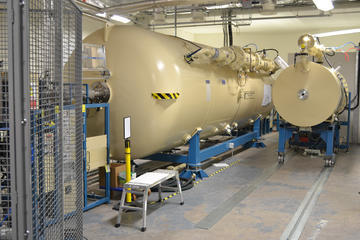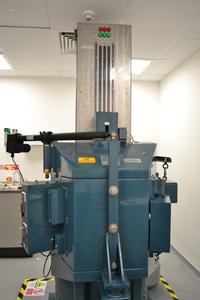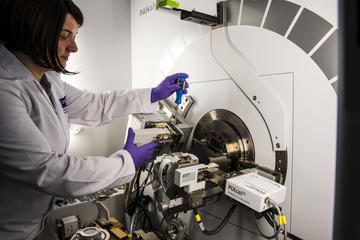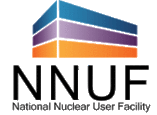Dalton Cumbrian Facility

Project lead: Prof Fred Currell
The Dalton Cumbrian Facility (DCF) provides the experimental infrastructure and expertise to allow universities and industry to carry out fundamental research in the area of radiation science. DCF is collocated with the largest concentration of nuclear industry facilities in the UK and incorporates large-scale irradiation equipment, complemented by instruments supporting a wide range of in-situ and ex-situ analytical techniques.
Ion beam accelerators
DCF houses two accelerators, a 5MV tandem Pelletron and a 2.5MV Pelletron, configured to provide for a range of ion irradiation and ion beam analysis capabilities across 8 beam lines. Ion beam irradiation allows rapid achievement of materials damage levels accumulated during many years of in-reactor exposure and provides data on the effects of radiation under very specific conditions of temperature, radiation dose rate and radiation dose.
The technique also allows for tightly controlled in-situ interrogation of materials properties during irradiation, providing data for use to develop and validate predictive radiation effects models. Dual ion beam capability allows for simultaneous gas implantation with radiation damage creation.

Ion beam technologies used to interrogate materials performance
Courtesy of The University of Manchester Dalton Nuclear Institute
The two accelerators are:
• An NEC model 15SDH-4 delivering Mz+ ions with energy 5(z+1) MeV, e.g. 1H+ ions up to 10 MeV, 4He2+ ions up to 15 MeV and heavy ions up to a possible maximum of 35 MeV. Six beam lines are available for selection from the 5MV tandem, including a high dose 'hot cell' and an Ion Beam Analysis end station. Two ion sources; one for high current 1H+ and 4He2+ beams, with a second source for lower currents of heavy ions.
• An NEC Model 7.5SH-2, capable of accelerating ions to energies up to 2.5 MeV. Equipped with an RF plasma source capable of producing 1H+, 4He2+ ions or heavier gas ions. Two beam lines, one of which can be configured to coincide a beam line from the 5MV tandem accelerator to provide two dual beam irradiation.
Gamma irradiator(s)

Studying the effects of gamma rays on materials
Courtesy of The University of Manchester Dalton Nuclear Institute
The FTS Model 812 cobalt-60 high dose rate gamma irradiator is designed and operated to support a wide range of research applications, with the aim of developing understanding of the mechanistic effects of gamma radiation on exposed materials. The instrument is capable of delivering dose rates from around 25 kGy/hr to less than 100 Gy/hr.
DCF also houses a Precision X-ray Multi-Rad 350 irradiator, capable of dose rates up to 140 Gy/min (unfiltered beam), for experiments where lower energy photons are more applicable.
Material modification, characterisation and analytical equipment

On-site technical expertise to support research projects
Courtesy of The University of Manchester Dalton Nuclear Institute
DCF provides a range of in-situ and ex-situ techniques designed to carry out detailed interrogation of the effects of radiation exposure on materials. Our laboratories are well suited to produce and analyse a wide range of materials, from spark plasma sintering innovative materials, such as nuclear ceramics, to identifying molecules with Raman spectroscopy, or to determine and map the texture and crystal structure of metals and composites (with our high end XRD and SEM). We also provide facilities and guidance for sample preparation, making all necessary steps of characterisation easily accessible in one place. This capability is complemented by a growing range of in-situ techniques to be used in conjunction with ion beam irradiations.
National programmes
In addition to NNUF, the Dalton Cumbrian Facility is part of two other strategically important national programmes designed to support access by researchers from academia and industry to high-end experimental equipment.
• The Henry Royce Institute, a partnership of nine leading institutions which is the UK’s national institute for advanced materials science research and innovation.
• The EPSRC UK National Ion Beam Centre, a partnership between the universities of Surrey, Huddersfield and Manchester which provides the academic research community with a single point of access to three complementary ion beam facilities, covering ion beam modification, radiation damage and ion beam analysis.
Experimental expertise
The DCF has a dedicated on-site team of research active expert experimentalists who are there to help the user community to design, develop and deliver experiments to a high standard and to interpret data and outcomes.
User interface
In the first instance a discussion of the intended research project should be instigated through contacting the general enquiries email below:
General enquiries: dcf.experiments@manchester.ac.uk
Location: Westlakes Science Park, Moor Row, Cumbria, CA24 3HA
https://www.dalton.manchester.ac.uk/research/facilities/cumbria-facilities/
Availability
DCF can accommodate external users, either in person or by delivering experiments on samples provided. In the first instance please do reach out to the DCF team to discuss requirements (dcf.experiments@manchester.ac.uk) and our experienced technical staff will work with you to inform your application.
Text and images courtesy of The University of Manchester Dalton Nuclear Institute.


